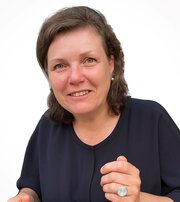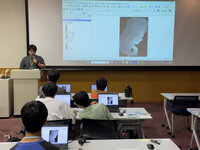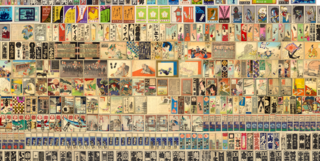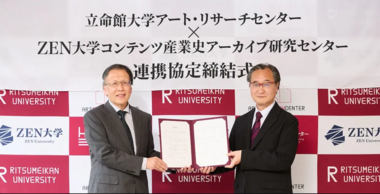-
 With the establishment of the International Joint Digital Archiving Center for Japanese Art and Culture (ARC-iJAC) in 2019, the Art Research Center strives to push the internationalization of research activities that transcend disciplines and geographic boundaries.
With the establishment of the International Joint Digital Archiving Center for Japanese Art and Culture (ARC-iJAC) in 2019, the Art Research Center strives to push the internationalization of research activities that transcend disciplines and geographic boundaries.NEWS
Announcement! Call for Applications--FY 2026/27 International Joint Research Projects, ARC-iJAC
Deadline: Mon, 15 Dec. 2025, 12:00 JST
Note: Starting from FY 2026, we are introducing a new category--International Early Career Researcher Projects (with Research Fund).
 August 2025: Prof. Ryo Akama and his team continued the digital archiving of the Japanese Collection at the Victoria and Albert Museum (V&A) in London.
August 2025: Prof. Ryo Akama and his team continued the digital archiving of the Japanese Collection at the Victoria and Albert Museum (V&A) in London.
We are truly grateful to Masami Yamada and Dr. Mary Redfern, Curators in the Asia Department at the V&A, for their generous support throughout the project.
September 2025: The 3rd Joint Colloquium of the Art Research Center (ARC) and the Center for Japanese Studies (CJS), University of California, Berkeley, was held at the C.V. Starr East Asian Library on September 17, fostering rich academic exchange.
A heartfelt thank you to Prof. Junko Habu and Prof. Jonathan E. Zwicker of the CJS.
She also reflects on the Museum's ongoing collaboration with the ARC since 2007, which has greatly enhanced public access to the collection through large-scale digitization and online publication. >> Read interview.
>> Related article: 572 Illustrated Books from the Collection of the Royal Museums of Art and History of Belgium (MRAH) have been released (Jan. 20, 2025)MRAH Collection of Illustrated Books:
https://www.dh-jac.net/db1/books/search_belgium.php
MRAH Collection of Ukiyo-e Prints:
https://www.dh-jac.net/db/nishikie/search_belgium.phpDatabase News! Over 2,600 Ukiyo-e Prints from the Collection of the Tobacco & Salt Museum have been released
We are pleased to announce that more than 2,600 ukiyo-e prints from the collection of the Tobacco & Salt Museum (たばこと塩の博物館) in Tokyo are now publicly available in the ARC Database.
This remarkable collection, mainly consisting of materials collected by the Monopoly Bureau of the Ministry of Finance, Japan, spans from the early Edo to the Meij period and offers rich insights into cultural, industrial, and commercial history. >> Read more.Tobacco & Salt Museum Database:
https://www.dh-jac.net/db/nishikie/search_tsm.php
Japanese Prints (Ukiyo-e) and Paintings Portal Database:
https://www.dh-jac.net/db/nishikie/search_portal.php
In addition to its world-renowned ukiyo-e collection, the Victoria & Albert Museum (V&A) in London also houses a long-overlooked collection of Japanese illustrated books (ehon), comprising over 1,700 volumes from the 17th to 20th centuries.
Previously only partially catalogued, this collection has now been the focus of a collaborative research and digitization project between the V&A's Asia Department, the Sainsbury Institute (SISJAC), and the ARC. Learn more in the V&A blog post "Revealing the V&A's Japanese Illustrated Book Collection" by Caroline Gill.
The Shinsō Culture Digital Archive, an ARC-iJAC joint research project, has been featured on the blog of the North American Coordinating Council on Japanese Library Resources (NCC).
The Shinsō Culture Digital Archive explores Japan's modern clothing culture through the concept of shinsō--the integration of body and clothing. Developed as part of the Minpaku Costume Database Project (MCD), the archive is led by Dr. Haruko Takahashi (National Museum of Ethnology) in collaboration with Dr. Keiko Suzuki (Ritsumeikan University/ARC), alongside an interdisciplinary research team.
The NCC blog post highlights two key databases--Chronology of Japanese Clothing Culture in the Modern Age Database and Image Database of Japanese Clothing Culture in the Modern Age.
A dedicated portal site for the Shinsō Culture Digital Archive is available through the ARC Virtual Institute.
NCC Blog post:
bit.ly/ncc_shinsou_archive
ARC Virtual Institute portal site: www.arc.ritsumei.ac.jp/lib/vm/shinsou/Video News! RARA-Hosted Symposium Available on YouTube
The symposium "アート×テクノロジーが"可視化"する未来研究デザイン ── 異分野融合で挑むデジタル・パブリックヒューマニティーズ (Visualizing Art and Technology through Future Research Design: A Transdisciplinary Challenge in Digital Public Humanities)" was organized by the Ritsumeikan Advanced Research Academy (RARA) in collaboration with the ARC (→Program).
Part 1/2
Part 2/2  Upcoming Events
Upcoming Events
To mark the launch of the College of Arts and Design/Graduate School of Science in Arts and Design at Ritsumeikan University's Kinugasa Campus in April 2026, the ARC began in October hosting a special seminar series featuring its faculty members who will be introducing their respective research themes.
How to join the seminar series:
→ Join via ZOOM. | → Join via YouTube.
November 19 (Wed), 2025, 18:30-20:00 JST
155. International ARC Seminar
Speaker: Kazushi MUKAIYAMA
(Professor, College of Arts and Design, Ritsumeikan University)
Topic: "Cultural heritage video mapping and Manga AI"
November 26 (Wed), 2025, 18:30-20:00 JST
156. International ARC Seminar
Speaker: Takashi KIRIMURA
(Associate Professor, Faculty of Cultural Studies, Kyoto Sangyo University/Professor, College of Arts and Design, Ritsumeikan University [from AY 2026])
Topic: "Digital Archive of Past Urban Landscape Using Photogrammetry"
December 10 (Wed), 2025, 18:30-20:00 JST
157. International ARC Seminar
Speaker: Sayoko UEDA
(Professor, Institute for General Education, Ritsumeikan University/Professor, College of Arts and Design, Ritsumeikan University [from AY 2026])
Topic: "From Exhibition to Exhibition: A Case Study of Ota Kijiro"
December 17 (Wed), 2025, 18:30-20:00
158. International ARC Seminar
Speaker: Ryoko MATSUBA
(Professor, College of Letters, Ritsumeikan University/Professor, College of Arts and Design, Ritsumeikan University [from AY 2026])
Topic: "Designing Connectives--Time, People, Skills, and Materials as Seen in Japanese Traditional Woodblock Printing"


Previous issues:
Summer 2025, Spring 2025, Winter 2024, Autumn 2024, Summer 2024, Spring 2024, Winter 2023, Autumn 2023, Summer 2023, Spring 2023, Winter 2022, Autumn 2022, Summer 2022, Spring 2022, Winter 2021, Autumn 2021, Summer 2021, Spring 2021, Winter 2020, Autumn 2020, Summer 2020, Spring 2020view this email in your browser Copyright © 2025 Art Research Center, Ritsumeikan University. All rights reserved.
Our mailing address is:
56-1 Toji-in Kitamachi, Kita-ku, Kyoto 603-8577 JAPAN
Want to change how you receive these emails?
You can update your preferences or unsubscribe from this list.[イベント情報]October 29, 2025(Wed)Related article → 572 Illustrated Books from the Collection of the Royal Museums of Art and History of Belgium (MRAH) have been released
Related databases → MRAH Old Books Database | MRAH Ukiyo-e Database
Background:
Nathalie Vandeperre graduated with a degree in Sinology from KU Leuven (Belgium), where she also obtained a diploma in Cultural Studies. After working for several years as a librarian in the Chinese Library and as a lecturer in the Educational Department of the MRAH, she joined the museum's East Asian Department. In 2013, she was appointed curator of the Japanese, Chinese, and Korean collections of the museum. She has curated several exhibitions and takes a particular interest in the history of the MRAH's collections.Ms. Vandeperre, thank you very much for your time today. Your academic background is in Sinology. What led you to pursue a career as a curator, and how did your interest in Japanese art develop?
Vandeperre: I studied Latin and Greek in secondary school, and when I entered university, I was eager to explore civilizations beyond the European classical world. I turned my attention to Asia but initially found it difficult to choose between Japanese and Chinese studies--I actually had no particular preference. I began studying sinology and soon developed a strong interest in Chinese art, especially painting.
At the beginning of my museum career, there were two curators--one responsible for the Chinese and Korean collections, and another one for the Japanese collection--and I was fortunate to work as an assistant to both. In 1999, I was assigned to the project of opening a Museum for Japanese Art, which truly marked the beginning of my deep engagement with the Japanese art collection. I found it absolutely fascinating.
Later, due to budgetary constraints, the two curatorial positions were merged after the curators retired, and that is how I came to oversee the entire East Asian collection. I have been very lucky in this respect.
The ARC has been collaborating with the MRAH since 2007 to digitize its extensive Japanese collection. Could you tell us how this collaboration was initiated?
Vandeperre: The collaboration with ARC was initiated by Dr. Daan Kok--now curator at the Wereldmuseum Leiden--who was our colleague in Brussels for a year. Through his efforts, Prof. Ryo Akama and his digitization team, led by Dr. Ryoko Matsuba, began the digitization of our prints in 2007. Since then, they have continued to visit twice a year--except during the COVID-19 pandemic--and over the years have managed to digitize the majority of our prints, illustrated books, historical maps, and kabuki posters.
Read more>>[イベント情報]September 25, 2025(Thu)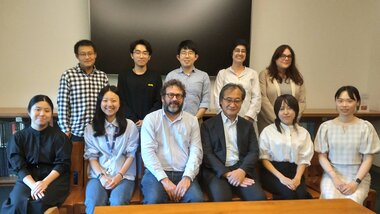
Organized by the Center for Japanese Studies (CJS), University of California, Berkeley, and the Art Research Center (ARC), Ritsumeikan University, a joint colloquium was held at the University of California, Berkeley, on September 17, 2025.
Date & Time: Wednesday, September 17, 2025, from 3:00 PM
Venue: East Asian Library, University of California, BerkeleyOrganizer: Art Research Center (ARC), Ritsumeikan University; Center for Japanese Studies (CJS), University of California, Berkeley
Supported by: International Joint Digital Archiving Center for Japanese Art and Culture (ARC-iJAC), Art Research Center, Ritsumeikan University(This was a closed event.)
Program
1. Modern and Contemporary Kyōyaki through Kiln Tools: A Case Study of the Fireclay Saggars from the Gorōsuke Asami Kiln
Presenter: Hina Kaneko(金子ひな)
2. The Transformation of the Tokyo Asahi Newspaper's Serialized Fiction in the Late Meiji Period (明治後期の東京朝日新聞における連載小説欄の変革)
Presenter: Subin Jeong (鄭スビン)
3. The Borrowing and Evolution of Illustrations in Enpon Parodies of Nise Murasaki Inaka Genji
Introduction
Presenter: Kirari Itami (伊丹稀星)
4. Dusk and Dawn of Literary Friendship: Santō Kyōden at the Turn of the Nineteenth Century (文の友、暮れと明け: 十九世紀をめぐる山東京伝)
Presenter: Yisheng Tang (唐藝晟)Reception
[イベント情報]September 22, 2025(Mon)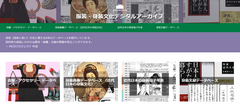
The Art Research Center (ARC), Ritsumeikan University, is pleased to share that the Shinsō Culture Digital Archive--adopted as an international joint research project by the ARC-iJAC in FY 2024 and FY 2025--has been featured on the blog of the North American Coordinating Council on Japanese Library Resources (NCC).
The Shinsō Culture Digital Archive investigates Japan's modern clothing culture through the concept of shinsō--the integration of body and clothing. Developed as part of the long-term Minpaku Costume Database Project (MCD), the archive is led by Dr. Haruko Takahashi (Visiting Researcher, National Museum of Ethnology) and realized through a cross-disciplinary collaboration that includes ARC faculty member Dr. Keiko Suzuki (Graduate School of Letters, Ritsumeikan University).
Among its four databases, the NCC blog highlights two in particular: the Chronology of Japanese Clothing Culture in the Modern Age Database, which reconstructs everyday dress and perceptions of the body from the Meiji Restoration to the end of World War II using contemporaneous newspapers, magazines, and catalogs; and the Image Database of Japanese Clothing Culture in the Modern Age, which leverages detailed illustrations from serialized novels and other materials to provide rare visual insights into styles and appearances of the time.
The ARC has supported the project by launching a dedicated portal site within the ARC Virtual Institute to enhance accessibility to these interdisciplinary resources both in Japan and internationally, aiming to broaden global engagement with Japan's clothing history and material culture.
Learn more about the project in the NCC's blog post "Japanese Studies Spotlight: Decoding Clothing Culture with the Shinsō Digital Archive," co-authored by Dr. Haruko Takahashi and Dr. Keiko Suzuki.
Explore portal site of the Shinso Culture Digital Archive in the ARC Virtual Institute: https://www.arc.ritsumei.ac.jp/lib/vm/shinsou/
[イベント情報]September 17, 2025(Wed)We are pleased to announce the 3rd Joint Colloquium co-hosted by the Center for Japanese Studies (CJS), University of California, Berkeley, and the Art Research Center (ARC), Ritsumeikan University.
Date & Time: Wednesday, September 17, 2025, from 3:00 PM
Venue: East Asian Library, University of California, BerkeleyOrganizer: Art Research Center (ARC), Ritsumeikan University; Center for Japanese Studies (CJS), University of California, Berkeley
Supported by: International Joint Digital Archiving Center for Japanese Art and Culture (ARC-iJAC), Art Research Center, Ritsumeikan University(This is a closed event.)
Program
1. Modern and Contemporary Kyōyaki through Kiln Tools: A Case Study of the Fireclay Saggars from the Gorōsuke Asami Kiln
Presenter: Hina Kaneko(金子ひな)
2. The Transformation of the Tokyo Asahi Newspaper's Serialized Fiction in the Late Meiji Period (明治後期の東京朝日新聞における連載小説欄の変革)
Presenter: Subin Jeong (鄭スビン)
3. The Borrowing and Evolution of Illustrations in Enpon Parodies of Nise Murasaki Inaka Genji
Introduction
Presenter: Kirari Itami (伊丹稀星)
4. Dusk and Dawn of Literary Friendship: Santō Kyōden at the Turn of the Nineteenth Century (文の友、暮れと明け: 十九世紀をめぐる山東京伝)
Presenter: Yisheng Tang (唐藝晟)Reception
[イベント情報]September 4, 2025(Thu)In addition to its world-renowned, extensive collection of ukiyo-e prints, the Victoria & Albert Museum (V&A) in London also holds a significant, yet long-overlooked collection of Japanese illustrated books (ehon).
Originally part of the National Art Library before being moved to the V&A's Asia Department, this collection comprises more than 1,700 volumes across approximately 500 different titles, spanning the 17th to 20th centuries.
Until recently, the collection had only been partially catalogued, with no comprehensive resource available. An ongoing research and digitization collaboration between the V&A's Asia Department, the Sainsbury Institute for the Study of Japanese Arts and Cultures (SISJAC), and the Art Research Center (ARC) is addressing this gap.
The project involves digitizing the books, compiling catalogue entries, and producing bilingual records (Japanese and English) for the V&A's Explore the Collections database.
Learn more about the collection, the project's background, and its achievements in the V&A blog post "Revealing the V&A's Japanese Illustrated Book Collection" by Caroline Gill.
URL: https://www.vam.ac.uk/blog/museum-life/revealing-the-vas-japanese-illustrated-book-collectionLondon, August 2025: Prof. Ryo Akama and his digital-archiving team with
Masami Yamada (Curator, Asia Department, Victoria & Albert Museum) With the establishment of the International Joint Digital Archiving Center for Japanese Art and Culture (ARC-iJAC) in 2019, the Art Research Center strives to push the internationalization of research activities that transcend disciplines and geographic boundaries.
With the establishment of the International Joint Digital Archiving Center for Japanese Art and Culture (ARC-iJAC) in 2019, the Art Research Center strives to push the internationalization of research activities that transcend disciplines and geographic boundaries.NEWS

Dr. Yamauchi presents his research on integrating GIS with emerging technologies such as VR and the metaverse to enrich geography education.
He also leads the Technical Support Board of the ARC, supporting researchers in visualizing spatial cultural resources through digitized maps, photogrammetry, and geospatial data.
>> Read interview.
>> About provision of ArcGIS accounts.Database News! Nōsatsu & Senshafuda Database of the Collection of the University of Oregon Library has been made public
As part of the "University of Oregon Nōsatsu Digitization and Metadata Cataloging Project" led by Kevin McDowell (Japanese Studies Librarian, University of Oregon) under the ARC-iJAC, we are pleased to share that more than 6,400 senshafuda and nōsatsu votive images from the University of Oregon's Gertrude Bass Warner Collection have been made available online through the ARC's database system.
The University of Oregon Libraries' collection is the largest collection of Japanese shrine and temple votive slips in North America. >> Read more.
The Nōsatsu & Senshafuda University of Oregon Database:
https://www.dh-jac.net/db/nishikie/search_oregon.php
ARC Nōsatsu Portal Database:
https://www.dh-jac.net/db/nishikie/search_Nosatsu.phpThe ARC held its first public exhibition of the Shuten-dōji Picture Scrolls once owned by William Sturgis Bigelow from June 1-13, 2025.
Believed to date to around 1650, the set of five scrolls, returned to Kyoto after 130 years abroad, represent a superb example of Edo-period picture scroll craftsmanship.


To accompany the exhibition, the ARC has launched a Virtual Museum that also includes related works not featured in the physical display.
ARC Virtual Museum
↓ ↓ ↓
'The W.S. Bigelow Shuten-dōji Picture Scrolls and Kyoto Folklore around Minamoto no Raikō's Four Heavenly Kings'On June 1, Ritsumeikan University's Kinugasa Campus hosted the Kinugasa Art Village Festival to mark the 125th anniversary of the Ritsumeikan Academy.
As part of this event, the ARC held an art dialogue on the global influence of ukiyo-e, featuring Dr. Shugo Asano, President of the International Ukiyo-e Society and Director of both the Abeno Harukas Art Museum (Osaka) and The Museum Yamato Bunkakan (Nara), and Prof. Ryo Akama, Director of the Art Research Center.
>> Read more.



On July 12, the public symposium "アート×テクノロジーが"可視化"する未来研究デザイン ── 異分野融合で挑むデジタル・パブリックヒューマニティーズ (Visualizing Art and Technology through Future Research Design: A Transdisciplinary Challenge in Digital Public Humanities)" was held, organized by the Ritsumeikan Advanced Research Academy (RARA) in collaboration with the Art Research Center (ARC).
Featured speakers included Prof. Ryo Akama (College of Letters), Director of the Art Research Center (ARC); ARC-affiliated faculty members Prof. Takanobu Nishiura and Prof. Satoshi Tanaka (College of Information Science and Engineering); and Dr. Monika Bincsik, Diane and Arthur Abbey Curator for Japanese Decorative Arts at the Metropolitan Museum of Art (The Met) and Visiting Senior Researcher at the ARC.
On June 9, the Art Research Center (ARC) and the History of Content Industry Archives Research Center (HARC) at ZEN University signed a Collaboration Agreement for Joint Academic Research.
The partnership aims to build a digital archive focused on media arts content, including oral history interview videos and materials related to dōjin creative works, to support the scholarly research on Japanese popular culture. >> Read more.The Art Research Center (ARC) and Director Prof. Ryo Akama Receive the Japan Art Documentation Society's Nogami Hiroko Memorial Award
This honor recognizes the long-standing contributions of Professor Akama and the Center in leading the digitization and dissemination of cultural resources related to Japanese art and traditional performing arts.
We are deeply grateful for this recognition, which affirms our mission to make Japan's cultural heritage more accessible to researchers and the public worldwide.
The award was presented at the JADS Annual Conference on June 14, 2025.Upcoming Events
September 17 (Wed), 2025
3rd Joint Colloquium of the Art Research Center (ARC), Ritsumeikan University & Center for Japanese Studies (CJS), University of California, Berkeley
(closed event)
Fall Semester 2025
International ARC Seminars
Information about the seminar series will be made available on the ARC website in due course.



Previous issues:
Spring 2025, Winter 2024, Autumn 2024, Summer 2024, Spring 2024, Winter 2023, Autumn 2023, Summer 2023, Spring 2023, Winter 2022, Autumn 2022, Summer 2022, Spring 2022, Winter 2021, Autumn 2021, Summer 2021, Spring 2021, Winter 2020, Autumn 2020, Summer 2020, Spring 2020view this email in your browser Copyright © 2025 Art Research Center, Ritsumeikan University. All rights reserved.
Our mailing address is:
56-1 Toji-in Kitamachi, Kita-ku, Kyoto 603-8577 JAPAN
Want to change how you receive these emails?
You can update your preferences or unsubscribe from this list.[イベント情報]August 21, 2025(Thu)Background:
Hiroyuki Yamauchi is an Associate Professor at the Kinugasa Research Organization, Ritsumeikan University, and a faculty member of the Art Research Center (ARC). He earned his master's degree in Letters from Nara University and went on to complete a PhD in Environmental Studies at the University of Tokyo.
His research focuses on the integration of Geographic Information Systems (GIS) with emerging technologies such as Virtual Reality (VR) and the metaverse to enhance geography education. By developing and evaluating educational materials through innovative technological approaches, he aims to make geography more accessible and engaging for learners.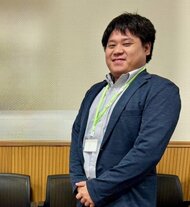 Dr. Yamauchi, thank you very much for your time today. To begin, could you share what initially sparked your interest in geography?
Dr. Yamauchi, thank you very much for your time today. To begin, could you share what initially sparked your interest in geography?Yamauchi: Geography is a discipline that explores a wide range of phenomena occurring in physical space, from the natural environment to human life. Geography is fascinating in that almost anything can be connected into it. What first attracted my interest was the relationships between regional history and the natural environment.
Your research focuses on the use of innovative IT tools--such as Geographic Information Systems (GIS) and Virtual Reality (VR)--to develop and evaluate educational materials for geography classes. What inspired you to explore this intersection of technology and geography education?
Yamauchi: Over the past 30 years, Geographic Information Systems (GIS) have become widely adopted, leading to more diverse research methods in geography and applications of digital maps in society. Geographic information has become a fundamental technology for modern life, and its importance continues to grow. In fact, GIS is now part of the high school geography curriculum in Japan.
However, some high school geography teachers are still unsure how to use GIS and other digital tools effectively in the classroom. Technologies like GIS and Virtual Reality (VR) make it possible to simulate on-site exploration of local areas studied in the classroom.
Read more>>[イベント情報]June 16, 2025(Mon)The Art Research Center (ARC) at Ritsumeikan University is pleased to announce that more than 6,400 nōsatsu and senshafuda votive images in the University of Oregon Library's Gertrude Bass Warner Collection of Japanese Votive Slips (nōsatsu) have been made available online.
The Nōsatsu & Senshafuda University of Oregon Database can be accessed here:
https://www.dh-jac.net/db/nishikie/search_oregon.phpThe collection is also integrated into the ARC Nōsatsu Portal Database, here:
https://www.dh-jac.net/db/nishikie/search_Nosatsu.php.The University of Oregon Libraries' collection is the largest collection of Japanese shrine and temple votive slips in North America. They range in date from the 1850s to the 1930s and feature images representing a wide range of themes, from seasonal celebrations and observances, historical and fictional figures, and scenes of everyday life to objects, buildings, and landscapes. Some depict pilgrims or members of nōsatsu collecting & exchange clubs (nōsatsu-kai).
Senshafuda and nōsatsu are believed to have originated in the 18th century, as printed slips of text or images purchased by pilgrims and plastered onto walls or pillars at shrines and temples as a devotional act. They later became collectors' items, and by the end of the 19th century were actively traded in nōsatsu-kai not dissimilar to surimono poetry prints circles which were also vibrantly active at the time. (For more on the latter, see the ARC Virtual Institute "Salons and Networks in Kyoto and Osaka": https://www.arc.ritsumei.ac.jp/lib/vm/Salon/)
Most of the votive slips in the University of Oregon's collection today were originally acquired in the 1910s to 1920s by Frederick Starr (1858-1933), a professor of anthropology at the University of Chicago who reportedly became so active and prominent in nōsatsu-kai collecting & exchange clubs that he came to be known as "O-fuda Hakushi" (Dr. Votive Slips).
This digitization and database construction effort was initiated by Kevin McDowell, Japanese Studies Librarian at the University of Oregon, in 2015 and continued as an International Joint Research Project under the International Joint Digital Archiving Center for Japanese Art and Culture (ARC-iJAC) in 2020. Though the project was placed temporarily on hiatus due to the Covid-19 pandemic and other factors, we are glad to now make this significant resource available to the public. We hope this database will support future research in art history, material culture, religious studies, and related fields.
For image use beyond personal research, please consult the Reproductions and Permissions policies and contact information for Special Collections at University of Oregon Libraries: https://library.uoregon.edu/find-materials/special-collections-and-university-archives/reproductions-and-permissions.
(Some information above is drawn from: https://oregondigital.org/collections/gb-warner-nosatsu, as well as from Kevin McDowell, "Echoes of Edo in the University of Oregon's Japanese Votive Slips Collection," presentation at European Association of Japanese Resource Specialists annual conference, 2024.)
[イベント情報]June 11, 2025(Wed)On June 9, 2025, the Art Research Center (ARC) at Ritsumeikan University signed a Collaboration Agreement for Joint Academic Research with the History of Content Industry Archives Research Center (HARC) of ZEN University.
The signing ceremony took place at Ritsumeikan University's Kinugasa Campus and was attended by Professor Koichi Hosoi, Director of the HARC, and Professor Ryo Akama, Director of the ARC and faculty member of the College of Letters.
Through the conclusion of this collaboration agreement, the two institutions aim to establish a digital archive of oral history interview videos video oral histories and materials related to dōjin creative works in the field of media arts content, with the following objectives:
1. The collecting and archiving of oral history interview videos video oral histories of individuals active in the fields of media arts--particularly manga, anime, and games--as well as the IT and internet culture sectors. These materials will be organized and made publicly available through a digital archive, transforming them into valuable scholarly resources for the study of modern Japanese popular culture.
2. As a 'Real-Time History Project,' the initiative seeks to promote the scholarly use of primary materials related to Comic Market (Comiket), Japan's largest convention for dōjin creative works. Issues related to the digitization and use of catalog booklets from past events as research materials will be examined, while building a digital archive to preserve and safeguard these materials.
About the HARC, ZEN University:
Established on September 30, 2023, the HARC is dedicated to the comprehensive and in-depth collection and preservation of primary materials related to people, objects, and events that have shaped the history of Japan's content industry. The HARC's mission is to make these archival materials available to the public for scholarly research, education, and the creation of new industries, contributing to their meaningful use in society.




